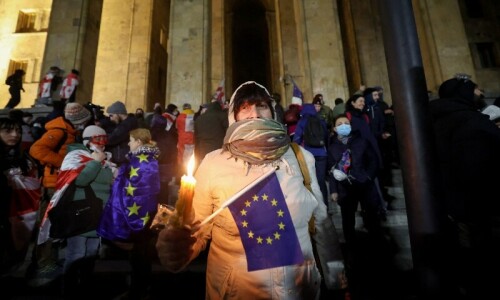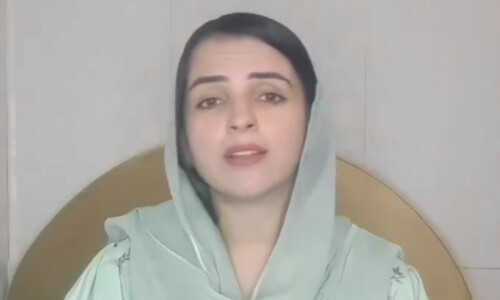QURNA: It’s one of the 20th century’s most iconic photos: British archaeologist Howard Carter inspecting the sarcophagus of Tutankhamun in 1922 as an Egyptian member of his team crouches nearby shrouded in shadow.
It is also an apt metaphor for two centuries of Egyptology, flush with tales of brilliant foreign explorers uncovering the secrets of the Pharaohs, with Egyptians relegated to the background.
“Egyptians have been written out of the historical narrative,” leading archaeologist Monica Hanna said.
Now with this weekend’s 100th anniversary of Carter’s earth-shattering discovery — and the 200th this year of the deciphering of the Rosetta Stone which unlocked the ancient hieroglyphs — they are demanding that their contributions be recognised.
Egyptians “did all the work” but “were forgotten”, said chief excavator Abdel Hamid Daramalli, who was born “on top” of the tombs at Qurna near Luxor that he is now in charge of digging.
Even Egyptology’s colonial-era birth — set neatly at Frenchman Jean-Franois Champollion cracking the Rosetta Stone’s code in 1822 — “whitewashes history”, according to specialist researcher Heba Abdel Gawad, “as if there were no attempts to understand Ancient Egypt until the Europeans came.” The “unnamed Egyptian” in the famous picture of Carter is “perhaps Hussein Abu Awad or Hussein Ahmed Said,” according to art historian Christina Riggs, a Middle East specialist at Britain’s Durham University.
The two men were the pillars, alongside Ahmed Gerigar and Gad Hassan, of Carter’s digging team for nine seasons. But unlike foreign team members, experts cannot put names to the faces in the photos.
‘Unnoticed and unnamed’
“Egyptians remain unnoticed, unnamed, and virtually unseen in their history,” Riggs insisted, arguing that Egyptology’s “structural inequities” reverberate to this day.
But one Egyptian name did gain fame as the tomb’s supposed accidental discoverer: Hussein Abdel Rasoul. Despite not appearing in Carter’s diaries and journals, the tale of the water boy is presented as “historical fact”, said Riggs.
On November 4, 1922, a 12-year-old — commonly believed to be Hussein — found the top step down to the tomb, supposedly because he either tripped, his donkey stumbled or because his water jug washed away the sand.
The next day, Carter’s team exposed the whole staircase and on November 26 he peered into a room filled with golden treasures through a small breach in the tomb door.
According to an oft-repeated story, a half century earlier two of Hussein’s ancestors, brothers Ahmed and Mohamed Abdel Rasoul, found the Deir el-Bahari cache of more than 50 mummies, including Ramesses the Great, when their goat fell down a crevasse. But Hussein’s great-nephew Sayed Abdel Rasoul laughed at the idea that a goat or boy with a water jug were behind the breakthroughs.
Riggs echoed his scepticism, arguing that on the rare occasions that Egyptology credits Egyptians with great discoveries they are disproportionately either children, tomb robbers or “quadrupeds”. The problem is that others “kept a record, we didn’t”, Abdel Rasoul said.
‘They were wronged’
Local farmers who knew the contours of the land could “tell from the layers of sediment whether there was something there,” said Egyptologist Abdel Gawad, adding that “archaeology is mostly about geography”.
Profound knowledge and skill at excavating had been passed down for generations in Qurna — where the Abdel Rasouls remain — and at Qift, a small town north of Luxor where English archaeologist William Flinders Petrie first trained locals in the 1880s.
Mostafa Abdo Sadek, a chief excavator of the Saqqara tombs near Giza, whose discoveries have been celebrated in the Netflix documentary series “Secrets of the Saqqara Tomb”, is a descendant of those diggers at Qift.
His family moved 600 kilometres (370 miles) north at the turn of the 20th century to excavate the vast necropolis south of the Giza pyramids. But his grandfathers and great-uncles “were wronged”, he declared, holding up their photos. Their contributions to a century of discoveries at Saqqara have gone largely undocumented.
‘Children of Tutankhamun’
Barred for decades from even studying Egyptology while the French controlled the country’s antiquities service, Egyptians “were always serving foreigners”, archaeologist and former antiquities minister Zahi Hawass said.
Another Egyptologist, Fatma Keshk, said we have to remember “the historical and social context of the time, with Egypt under British occupation.” The struggle over the country’s cultural heritage became increasingly political in the early 20th century as Egyptians demanded their freedom. “We are the children of Tutankhamun,” the diva Mounira al-Mahdiyya sang in 1922, the year the boy pharaoh’s intact tomb was found.
Published in Dawn, November 7th, 2022
















































Dear visitor, the comments section is undergoing an overhaul and will return soon.